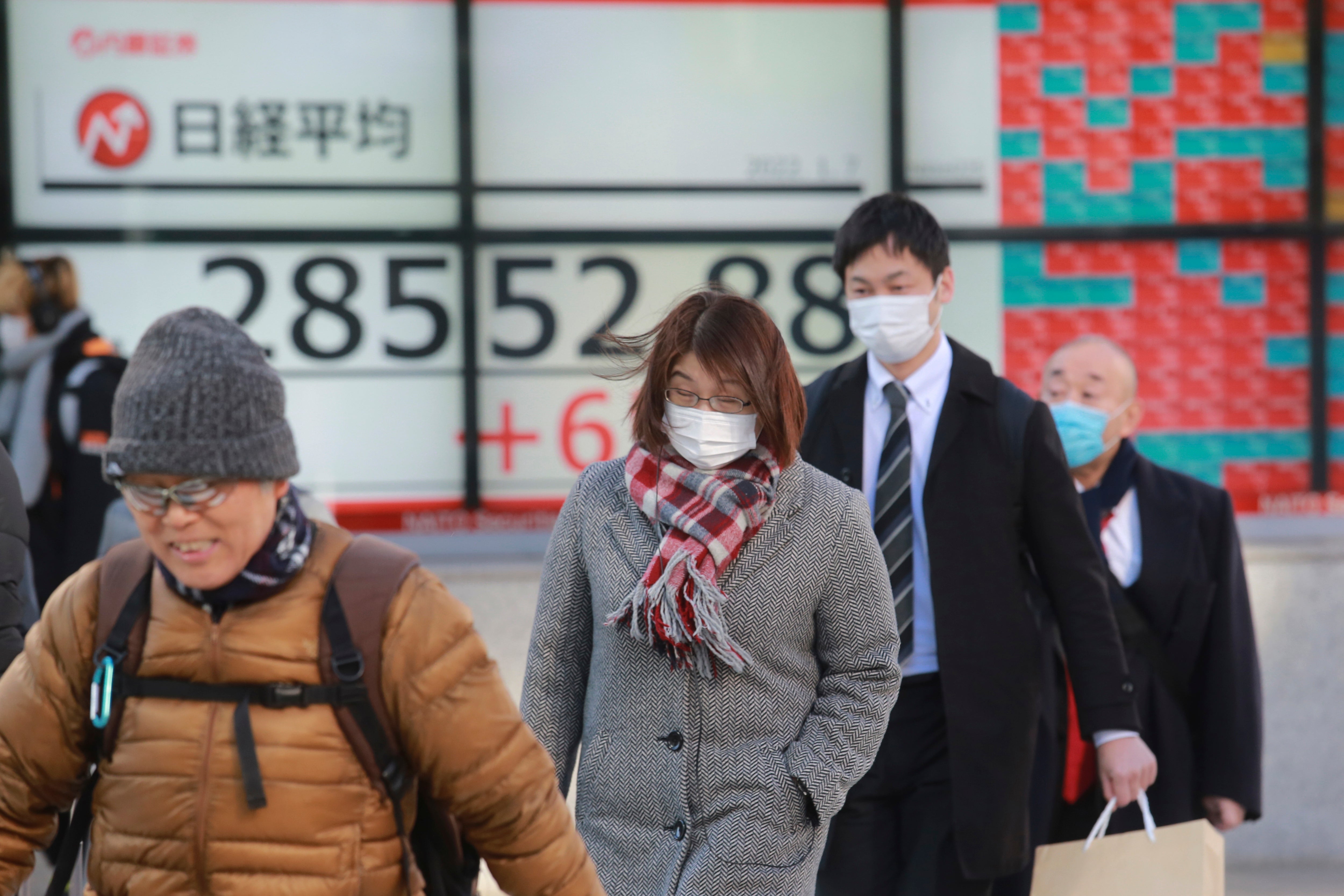Asian shares mixed after tech-led decline on Wall St
Asian markets are mixed after more declines in big technology stocks pulled major indexes lower on Wall Street

Your support helps us to tell the story
From reproductive rights to climate change to Big Tech, The Independent is on the ground when the story is developing. Whether it's investigating the financials of Elon Musk's pro-Trump PAC or producing our latest documentary, 'The A Word', which shines a light on the American women fighting for reproductive rights, we know how important it is to parse out the facts from the messaging.
At such a critical moment in US history, we need reporters on the ground. Your donation allows us to keep sending journalists to speak to both sides of the story.
The Independent is trusted by Americans across the entire political spectrum. And unlike many other quality news outlets, we choose not to lock Americans out of our reporting and analysis with paywalls. We believe quality journalism should be available to everyone, paid for by those who can afford it.
Your support makes all the difference.Asian markets were mixed Friday after more declines in big technology stocks pulled major indexes lower on Wall Street
Tokyo Shanghai and Taiwan slipped but most other regional markets advanced. U.S. futures also were higher.
A resurgence of coronavirus outbreaks has added to uncertainties over a revival of tourism and other business activity across Asia.
The World Health Organization says a record 9.5 million COVID-19 cases were tallied over the last week as the omicron variant of the coronavirus swept the planet, a 71% increase from the previous 7-day period that the U.N. health agency likened to a “tsunami.”
Asia has seen smaller numbers but infections are rising rapidly and bottlenecks in testing mean that still more cases are likely unreported. At the same time, alarm has been kept in check by signs the omicron variant may cause less severe illness, especially in countries with high levels of vaccination against COVID-19.
“The highly transmissible omicron variant is a near-term growth risk for low vaccinated emerging market economies, and to supply chains amid China’s zero-COVID strategy," Sonal Varma of Nomura said in a report.
Tokyo's Nikkei 225 index edged less than 0.1% lower to 28,478.56 and the Hang Seng in Hong Kong jumped 1.5% to 23,422.04. South Korea's Kospi gained 1.2% to 2,954.89, while the Shanghai Composite index shed early gains to fall 0.2%, closing at 3,579.54. In Australia, the S&P/ASX 200 rose 1.3% to 7,453.30.
Shares in Taiwan dropped 1.1% and India's Sensex was down 0.2%.
On Thursday, the S&P 500 slipped 0.1% to 4,696.05. The Dow slipped 0.5% to 36,236.47. The Nasdaq composite lost 0.1% to 15,080.86, while smaller company stocks bucked the broader market, with the Russell 2000 index gaining 0.6% to 2,206.37.
Weakness in big tech companies like Apple was the main culprit. The iPhone maker fell 1.7%. Health care stocks also helped drag down the benchmark S&P 500 index, outweighing gains by banks, energy companies and other sectors.
Bonds continued to climb. The yield on the 10-year Treasury rose to 1.73%, the highest level since March. It was 1.70% late Wednesday.
The selling followed a broad slide for the markets on Wednesday, when the Federal Reserve indicated it was ready to raise interest rates to fight off inflation.
Stocks have been choppy this week as traders reacted to the big rise in bond yields. The S&P 500 and Dow both set all-time highs on Monday, only to lose ground in subsequent days. The major indexes are now on pace to post weekly losses.
Wall Street has also been weighing economic data.
On Thursday, The Institute for Supply Management reported that growth in the U.S. service industry, where most Americans work, pulled back in December after expanding at a record pace the previous two months.
The Labor Department reported that the number of Americans applying for unemployment benefits rose last week but remained at historically low levels, suggesting that the job market remains strong. The agency will release its monthly jobs report on Friday.
Wall Street may be bracing for a stronger-than-expected jobs report, given that payroll processor ADP’s latest monthly hiring survey, which was released Wednesday, showed that private U.S. companies hired 807,000 workers in December, or more than double the consensus forecast, according to FactSet. A strong jobs report could add urgency to the Federal Reserve's efforts to tackle inflation by raising interest rates.
In other trading Friday, U.S. benchmark crude oil added 67 cents to $80.13 per barrel in electronic trading on the New York Mercantile Exchange. It jumped 2.1% on Thursday, helping to push energy stocks higher.
Brent crude, the basis for pricing international oil, climbed 67 cents to $82.66 per barrel.
The U.S. dollar was at 115.93 Japanese yen, up from 115.85 yen late Thursday. The euro rose to $1.1303 from $1.1298.